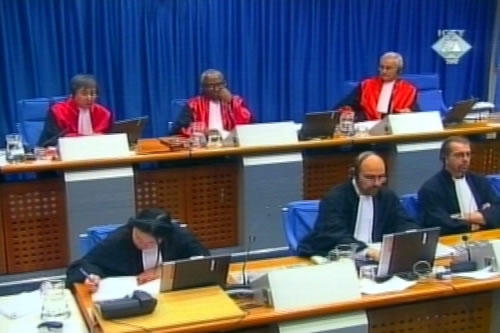Home
JUDGES WANT TO CONCLUDE MILOSEVIC TRIAL ON KOSOVO INDICTMENT
Judging that it may be in the interest of justice to sever the Kosovo indictment against Milosevic, conclude that part of the trial and render their judgment, the judges call the parties to present their arguments at a hearing to be held on 29 November 2005. The prosecution is opposed to severing the case
 Trial chamber in the Milosevic case
Trial chamber in the Milosevic case In an attempt to bring to a close at least a part of the Slobodan Milosevic trial, the judges today aired again the idea about severing the case into three different trials on the indictments charging the former Serbian and FRY president with crimes against humanity in Kosovo and Croatia and genocide in BH. The Trial Chamber invited, in an order issued today, the parties – the accused, his assigned counsel and the prosecutor – to state their arguments on the idea to sever the Kosovo indictment from the rest of the case and to bring that part of the trial to a close. The hearing has been scheduled for Tuesday, 29 November.
The idea to sever the case and to try the accused on each indictment separately was first aired by the Trial Chamber last July, as it conducted a "radical review" of the past and future course of the trial, bogged down by frequent adjournments due to the ill health of the accused. At that time, both the prosecutor and the amici curiae were opposed to the idea. The former felt that to sever the case would be to make "an irreparable mistake", while the latter claimed that this would "harm the accused". Faced with those views, the judges backed down on the severance initiative and instead turned the amici curiae into assigned counsel.
Sixteen months later, the judges revisit the idea of severance, figuring that it could be more acceptable to the parties at this point. Referring to the list of defense witnesses and the statements made by the accused, the Chamber considers that Milosevic "has almost completed" his case on the Kosovo indictment, using up approximately three quarters of the time allotted to him to challenge the allegations in all three indictments.
Last June, the assigned counsel – who were amici curiae at the time – wanted Milosevic to be tried first on the Kosovo indictment, if the case were to be severed after all, and wanted the accused to be given 150 days for the presentation of his case. The case was not severed, but because the events followed the scenario favored by the assigned counsel, and they could consequently have a more positive view towards the judges' idea now.
The severance of the case at the time when he has less than thirty days to complete his case, according to the current schedule, could be the only way for Milosevic to get more time to challenge the allegations regarding Croatia and BH. If he is really convinced, as he claims, that he has "routed the prosecutor and his false witnesses" with his evidence and witnesses he has called, then the severance of the case could be a chance for Milosevic to start the trial for Croatia and BH as a free man, acquitted of the charges in the Kosovo indictment.
The prosecution will, as its spokesperson Florence Hartmann announced today, "oppose any attempt to sever the case". Hartmann did not want to give away the arguments the prosecution would present at the hearing on 29 November, but it will probably not be different from the arguments presented last year, when the prosecution argued the severance would be "an irreparable mistake".
Interpreting the Chamber's idea, the prosecution stated last year that it would give rise to concerns that a single trial on all three indictments might "for this or that reason: never be brought to an end. In that case, the prosecution noted in its brief, it might seem desirable to get "at least one judgment" on one or two indictments, rather than to risk having "no judgment at all". The prosecution, however, considers this approach "premature", adding that it is based on "speculations and giving too much importance to impressions rather than reality". According to the prosecution, the actual process of finding facts and creating a historical record of what happened in Croatia, BH and Kosovo is just as important, if not more so, than the judgment itself.
Linked Reports
- Case : Milosevic Slobodan - "Kosovo, Croatia and Bosnia"
- 2005-11-21 SICK LEAVE FOR MILOSEVIC
- 2005-11-21 MILOSEVIC TRIAL ADJOURNED UNTIL 29 NOVEMBER
- 2005-11-18 JUDGE BONOMY AND MILOSEVIC'S "CRYPTIC STATEMENT"
- 2005-11-29 MILOSEVIC AND NICE OPPOSE SEVERANCE
- 2005-11-30 LIEUTENANT COLONEL SEL'S WORKBOOK
- 2005-12-01 GENERAL JELIC: "NOT A CHANCE OF SOMEONE FIRING AT CIVILIANS "
